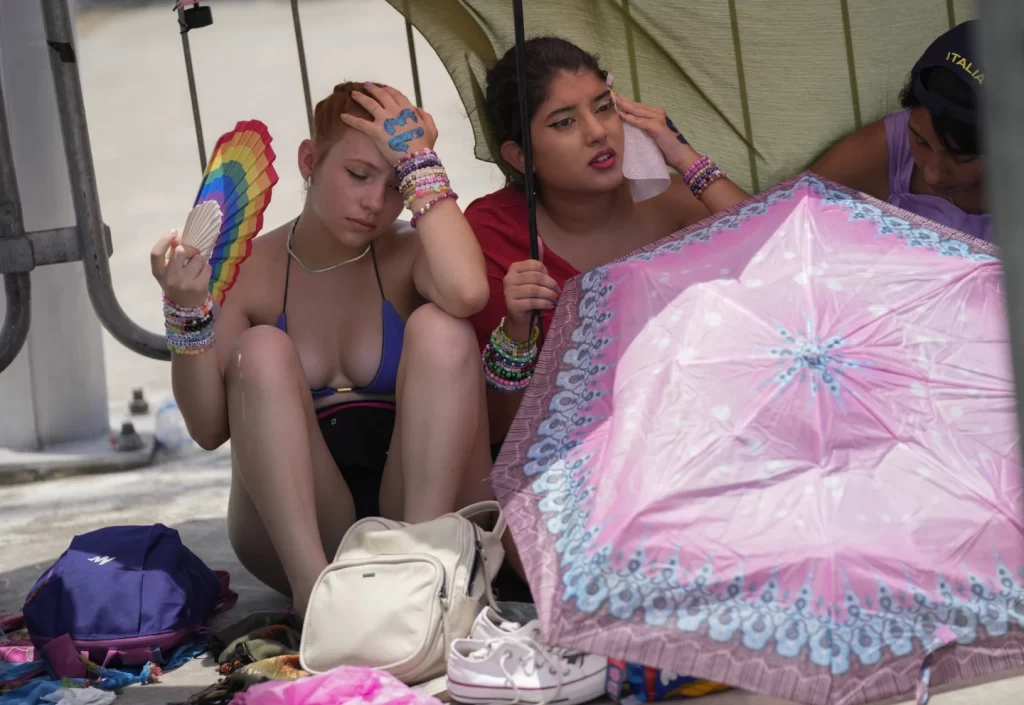
RIO DE JANEIRO Brazilian climatologist Núbia Beray Armond for years had been sounding the alarm about Rio de Janeiro’s need for an extreme heat plan including water distribution. Interest was tepid until a disastrous Taylor Swift concert — and now her phone won’t stop ringing.
A stifling heat wave blanketed southeast Brazil the day of Swift’s concert last November, just before the start of summer in the Southern Hemisphere. Tens of thousands of “Swifties” lined up for hours under a sweltering sun, some huddling beneath umbrellas. Once inside, a group of parched fans managed to get Swift’s attention; she paused her performance to ask staff to provide them with water.
Not everyone was so lucky. Ana Clara Benevides, 23, suffered heat exposure that caused cardiorespiratory arrest during the concert, and she died.
Her death sparked outrage. Many accused organizers of failing to deliver sufficient water for concertgoers. Brazil’s justice minister said the death was unacceptable, and his ministry issued a regulation obliging organizers of big events during heat waves to guarantee water for attendees.Others were galvanized to enshrine water access into law, a sign Brazilian authorities have begun considering it a public health issue in an ever-hotter world.
Rio is in the vanguard. Of the almost 100 bills now working their way through municipal, state and federal legislatures, about a third are in Rio state, including the capital, according to an analysis by the consulting firm Governmental Radar, which dubbed it “the Taylor Swift effect.” Many of the bills are named after Benevides.
Niteroi, a city in Rio’s metropolitan region, was first to pass a municipal ordinance guaranteeing water at large events.
“Beyond a shadow of a doubt, Benevides’ death was a turning point in the issue of water distribution for Rio’s public administration,” said Beray Armond, coordinator of the Federal University of Rio de Janeiro’s GeoClima laboratory and researcher at Indiana University Bloomington.Brazil’s summer has been particularly oppressive. Nine heat waves swept across the country in 2023, and three since January, according to the government’s meteorology institute.
The heat index — what the temperature feels like to the human body when humidity is combined with air temperature — hit a record 59.3 degrees Celsius (138 Fahrenheit) the day of Swift’s concert. That record has been broken four times since, most recently during the March 11-18 heat wave, when the heat index reached 62.3 degrees Celsius (144 Fahrenheit) on Sunday.
In Rio, people sought relief at beaches such as Copacabana and Ipanema. Thousands of colorful parasols fluttered in the sea breeze, and people dipped into the waves. But some, like 43-year-old Eduardo Alves de Castro, found it hard to relax.
“It’s worrisome because we wonder how far these high temperatures are heading. The concern is that there’s no end to it. We are in a very privileged place: Here in front of the beach, you cool off, but there are people in a much less favorable situation, and who are much more affected,” Castro said.
During heat waves, those unable to afford power bills from round-the-clock air conditioning often cool down with multiple showers a day, which deplete a shared tank or run up water bills.
Many people in favelas — urban, working-class neighborhoods — didn’t pay for water until three private companies assumed concessions in 2021 and began installing water meters. The largest of them, Waters of Rio, said in an email it has provided water to an additional 300,000 people since taking over.
Daiane Nunes, who lives in Rio’s Rocinha favela, regularly treks uphill to a natural water source in the forest. She and fellow residents fill bottles in a small flow of water there.
“The water that comes from our pipes is impossible to drink because it contains a lot of chlorine. Apart from buying water, this is our only chance of getting natural water,” said Nunes, 33.







